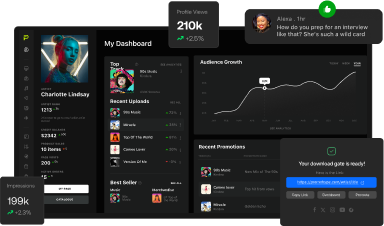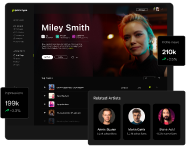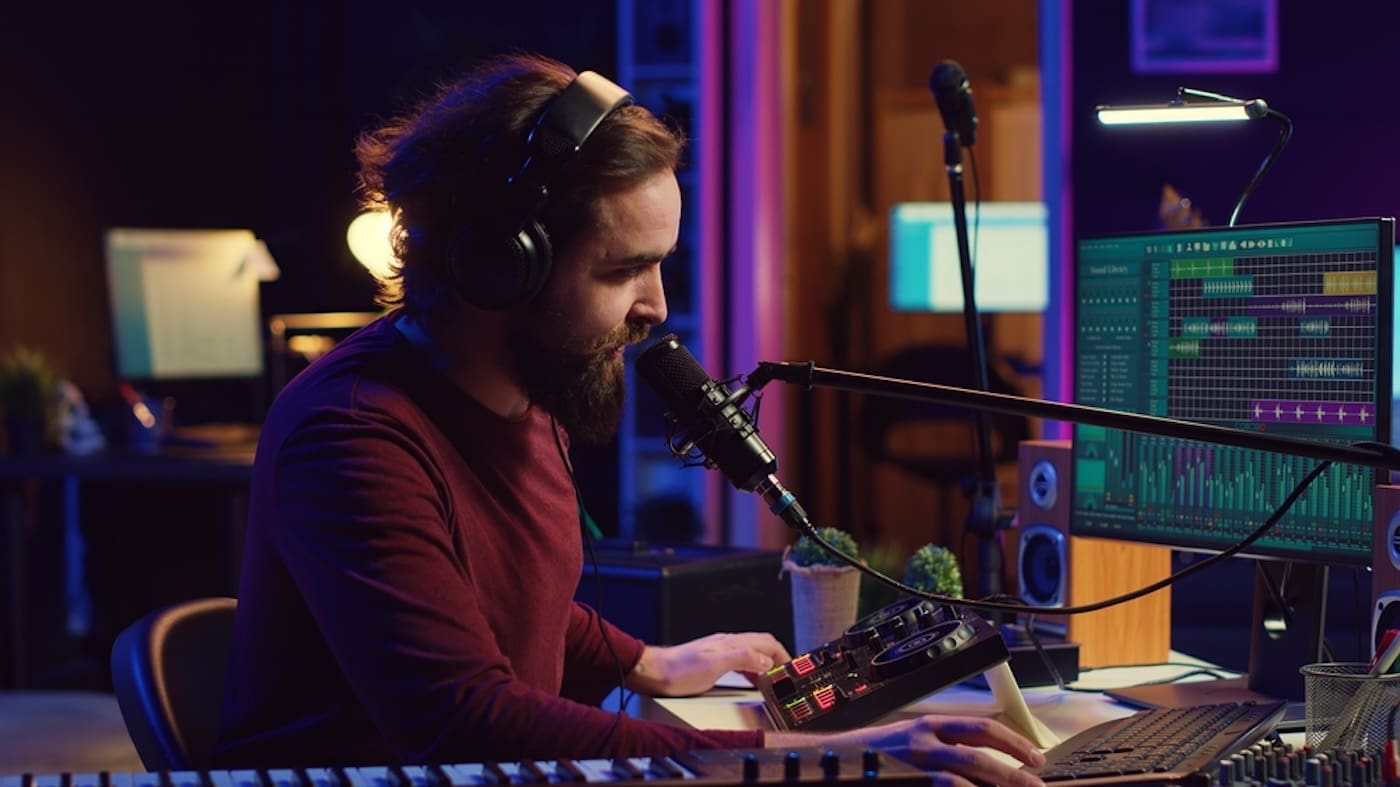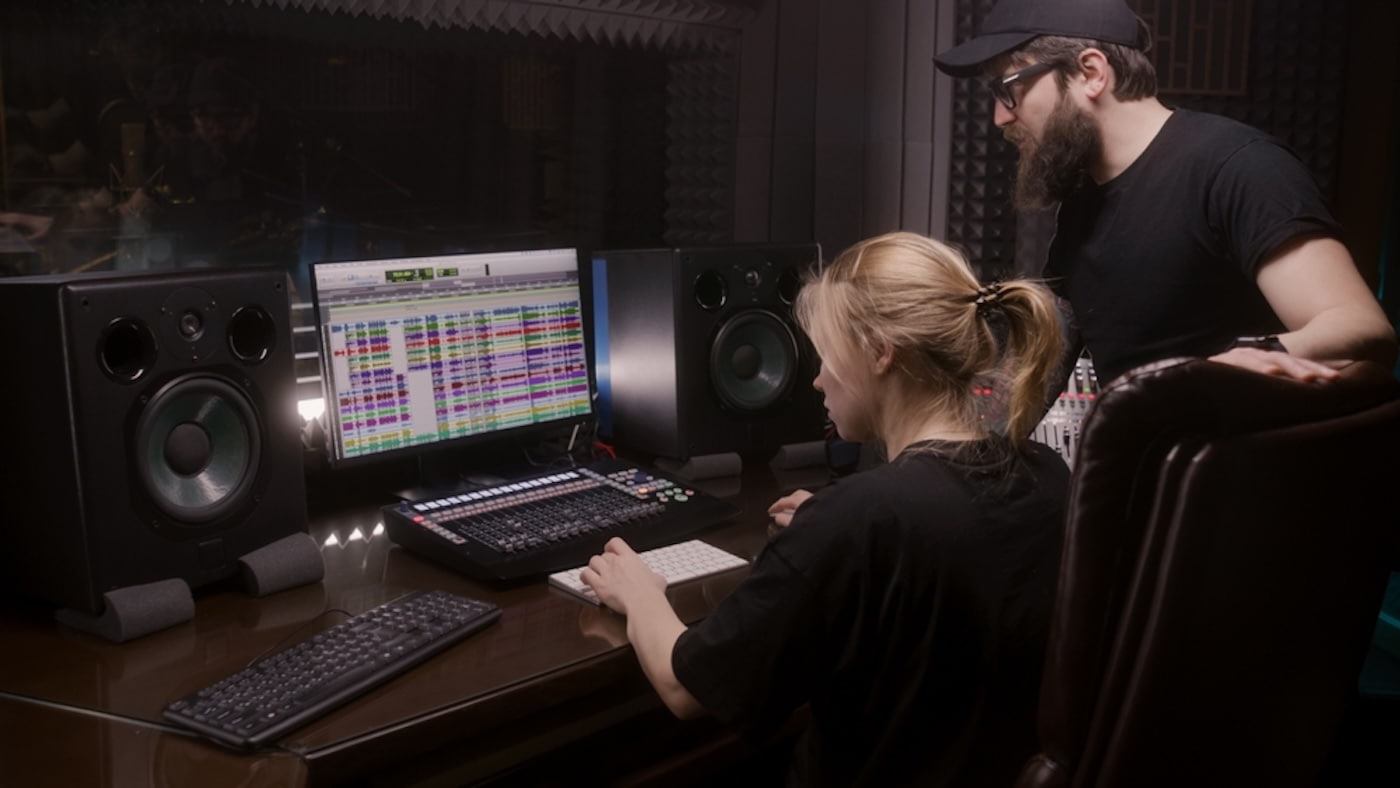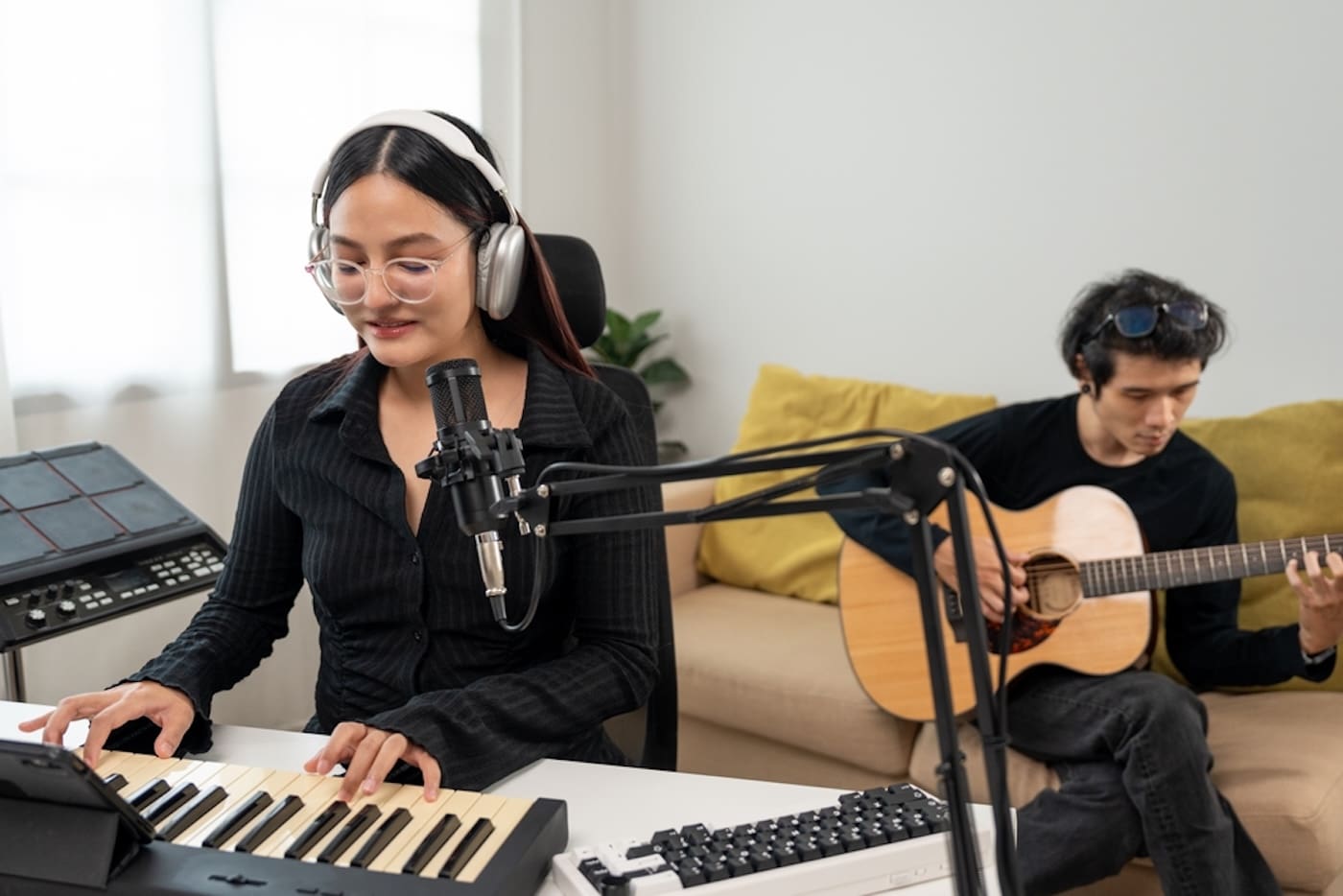
Understanding what an independent artist is has become essential as technology reshapes how music is created, released, and discovered. More musicians than ever are choosing to work independently without the backing of a record label.
This guide explores what it means to be an independent artist, breaking down the pros and cons, spotlighting some of today’s best independent artists, and showing you how to build a thriving career on your own terms.
Get Early Access
To Promo Hype
What Is An Independent Artist?
An independent artist, sometimes referred to as an “indie artist,” is a songwriter or producer who operates without the backing of a record label.
This arrangement enables independent artists to create music without any constraints on their creativity or outside control over their careers.
As the indie music sector has evolved, independent artists are on the rise, with a range of intuitive tools to assist with distribution and promotion.
Digital music stores, streaming services, and limited-edition physical sales are all monetization options that independent artists can utilize.
Combined with a strong social media presence and live performances, these platforms enable indie artists to build a consistent and long-lasting music career.
Essential reading: Music terms glossary.
Independent Artists In The Music Industry
Whereas once independent artists were considered outsiders, their position in the music industry has changed in recent years.
No longer on the fringes of the scene, independent artists represent a significant force, pushing the boundaries of musical creativity.
Empowered by innovative tools and platforms, they’re able to release music online directly to their fans without the need for major label support.
It’s also easier than ever for independent artists to set up their own record labels, distributing songs digitally to a global audience.
Today, there’s a revolving door between independent artists and the music industry, with signed artists often reverting to independence.
Major artists in popular music genres, such as Taylor Swift and Radiohead, have all returned to independence after working with record labels.
As Radiohead’s Thom Yorke explained, independence allows them “to do what makes sense to us without having to explain ourselves.”
It’s a sentiment that many successful independent artists in the music business feel a close affinity to.
Independent Vs. Unsigned Artists
There’s a common misconception that being an independent artist means no association with any form of record label.
In reality, many artists collaborate with independent labels that share their creative vision and focus on a particular niche genre.
Independent artists can also make money with music by self-releasing and establishing their own label to promote independent releases.
In contrast to this arrangement, unsigned artists have no record label contract, relying on grassroots strategies to reach an audience.
There are overlaps between independent artists and unsigned artists, particularly in the mindset that drives their decision-making.
With the rise of digital distribution services and self-promotion tools, the distinction between these two areas has become increasingly blurred.
Learn more: What is an EPK?
Advantages of Being an Independent Artist
We’ve touched briefly on the creative benefits independent musicians and artists experience when producing music independently.
Let’s break down these advantages in more detail, from the high level of creative freedom to complete control of your music release schedule.
Artistic Freedom
The major record labels and publishers are notorious for instructing musicians on their artistic direction and desire to capture market trends.
Retaining independence allows artists to write a song however they want, free from the constraints of managers and marketing teams.
This artistic freedom enables a creative approach to song structure, allowing for experimentation with lyrics and production methods.
Complete Control & Ownership
While record label contracts demand a cut of revenue, independent artists retain complete control and ownership of their recorded music.
Indie artists retain copyright ownership of any master recordings, allowing them to distribute music and keep all the revenue it generates.
This opens up many opportunities for long-term monetization, particularly if the artist achieves widespread recognition and success.
Financial Independence
The degree of ownership and control carries across to financial independence, achieved through a diversified income.
Many of the best music producers choose to retain their independence, generating revenue from multiple reliable streams.
Merchandise sales, music royalties from streaming platforms, and licensing deals can all bolster this financial independence.
This can then be reinvested in new music equipment, better instruments, and to cover recording studio fees.
Direct Engagement With Fans
Social media is a ubiquitous presence in music promotion, enabling independent artists to go viral on platforms like TikTok without the support of major labels.
This direct engagement cuts out the middleman, giving bands and artists a distinct voice and facilitating vital fan feedback.
Indie artists can use Facebook, X, and Instagram to promote upcoming releases and share band merch ideas directly with their audience.
With the emergence of new platforms that help independent artists drive fan engagement, communication has never been more transparent.
Get Early Access
To Promo Hype
Challenges of Being an Independent Artist
While there’s a distinct allure to the concept of independence, new artists must also be aware of the challenges that come with it.
If you’re becoming a music producer or songwriter and are considering independence, here are some potential challenges to consider:
Potentially Limited Resources
Writing and producing music independently requires access to a recording studio and other resources to ensure the quality of productions.
Some independent artists lack the necessary tools to properly mix music, as studio sessions are often out of reach due to high costs.
They can also face additional costs, such as professional mixing and mastering, which signed artists don’t have to worry about.
Likewise, indie artists may lack the necessary resources and music industry contacts for distribution and promotion.
This can lead to limited exposure, particularly when entering a market with hundreds of daily releases to compete with.
Higher Financial Risks
The financial freedom afforded to independent artists comes at a price of higher financial risks that major labels take on.
Investing in a home recording studio can lead to unrecoverable expenses if music sales fail to meet expectations.
Additional costs, such as producing music videos, can soon become substantial alongside general music production expenses.
Some independent artists circumnavigate these challenges, allowing fans to set prices and determine the value of their music.
Managing finances while consistently creating content can be highly demanding, particularly for early-stage music careers.
Difficulty Managing Schedules
Independent artists juggle multiple roles, including writing and producing music, managing social media, and overseeing digital music distribution.
Additional tasks, such as submitting music to radio stations and creating websites, can all sap time and energy from making music.
The result can lead independent artists to become swamped in tasks that dedicated teams would otherwise handle.
Focusing on creating merchandise and managing accounts can detract from other priorities, such as getting gigs as a musician.
Fortunately, there are many excellent tools indie artists can use to streamline these processes and reduce the associated pressure.
By implementing these tools, artists can automate tasks such as the distribution of new releases while remaining independent.
Related read: The ultimate artist management guide.
How To Become An Independent Artist
Turning your passion for music into a sustainable career is the dream of many songwriters and producers.
Becoming an independent artist allows you to create, release, and promote your music on your own terms while building a brand that reflects your unique sound and vision.
Here’s how to start your journey and establish a successful independent music career:
- Define your artistic vision: To become a successful independent artist, you must forge a unique vision and style that stands out in a competitive market. This means deciding what image or persona you want to be associated with your music.
- Produce high-quality content: Independent artists must cover all bases by complementing well-produced music with artwork, logos, and other content.
- Establish a brand and online presence: After creating your brand elements, replicate them consistently across your online presence. If you haven’t set up an artist or band website, this is an essential platform for driving ticket and merch sales.
- Manage business obligations: Handing administration correctly is critical, from trademarking your band name to royalty collection and general finances. You can use tools to automate many administrative tasks, freeing up time to create music.
- Promote your music: When it comes to making money as an independent artist, promotion is key to success. Once you’re music is on Apple Music and other platforms, submit it to playlists, use your social media presence to generate buzz, and engage with your fans.
Attending industry events and networking with local musicians can help you build valuable contacts that can advance your career.
Releasing Music As An Independent Artist
Independent artists thrive when they’re able to release music on singles, EPs, and albums with a focused creative direction.
Here’s an overview of the options indie artists have for releasing their music and building their fan base:
Self-Releasing On Digital Platforms
The music industry has undergone a substantial transformation with the rise of streaming services and digital formats.
This allows independent artists to engage in self-releasing with minimal overhead, controlling their schedules, artwork, and marketing.
By utilizing a music distribution service, indie artists can upload across all streaming platforms to instantly reach a global audience.
These services also allow artists to retain 100% of revenue earned from mechanical and performance royalties.
Releasing Through Indie Labels
Independent record labels often share similar creative sensibilities as their artists, making them a good fit for niche genres.
Independent musicians can find record labels that are looking for artists in their field by researching their favorite acts.
They also have the option to start their own record label, leveraging their network to build a roster of like-minded artists.
Record Deals With Major Labels
Artists considering relinquishing complete control of their works can seek out a deal with major labels and music publishing companies.
While the arrangement represents a potential creative trade-off, major labels provide access to resources and marketing teams.
They’re also well-positioned to secure music licensing deals, albeit for a cut of any income from royalties and other sources.
Read this next: How to get signed to a record label.
What Independence Means For Artists
If you’re starting a music career, the complexities of the industry can be daunting to understand fully.
Here are some of the latest music industry trends to help you navigate the scene and build a lasting reputation:
- Understanding the challenges of breaking through: The democratization of music production has led to a proliferation of frequent new releases. This means that independent artists need to carefully consider their core appeal and how they can differentiate themselves from the crowd.
- Considering new hybrid models: In recent years, labels have shifted strategies away from long-term contracts toward short-term partnerships. This allows up-and-coming artists to test the water without committing to arrangements that limit their creative choices.
- Utilizing new technologies: New music technology has impressive potential for empowering artists to reach international audiences with minimal financing. Embracing these tools can elevate their artistic freedom without the need for a recording contract.
By staying on top of the latest music industry developments, you can adapt on the fly and capitalize on emerging trends.
Top 5 Best Independent Artists
There are numerous examples of high-profile singers and bands that have achieved massive success without major label support.
These successful independent artists stand as an inspiration for all acts considering going it alone:
5. Hanson
Hanson’s negative experience with major labels was evident when Def Jam Music Group refused multiple releases.
The group has since formed an independent label and enjoyed commercial success with the self-released album, Underneath.
4. Macklemore
Macklemore’s success as an independent artist is evident from his music sales, as well as the billions of YouTube views he has garnered.
Along with Ryan Lewis, he topped the Billboard Hot 100 charts with no corporate backing for the release “Thrift Shop.”
3. Chance the Rapper
Chance the Rapper set the benchmark for independence in the hip-hop scene with the release of his rap album, Coloring Book.
He’s since declined multiple record deal offers and continues to dominate the ratings on streaming platforms.
2. Arctic Monkeys
Arctic Monkeys enjoyed massive success early in their career by partnering with the indie label Domino Recording Company.
This allowed the band to retain control over their music and image while still collaborating with high-profile artists.
1. Radiohead
Following a lengthy and sometimes turbulent relationship with EMI, Radiohead decided to release their seventh album independently.
The album, Rainbows, was offered as a free download for fans and established the practice of allowing customers to set their own prices.
Other notable independent artists who have enjoyed significant success include Mya, Bon Iver, and Frank Ocean.
Tips & Resources
The creative industries are rapidly evolving to respond to emerging trends, and the music industry is no different.
If you’re a fledgling independent artist, these resources and valuable tips will drive your career in the right direction:
- Utilize music marketing tools: Although independent artists may lack the resources of major labels, they can still leverage a range of music marketing tools. Platforms like SubmitHub and ActiveCampaign are powerful resources for promoting new releases to a broad audience.
- Apply AI tools when relevant: While artificial intelligence poses challenges to authorship and musical integrity, it can also be a powerful tool for artists. Used judiciously, AI music production tools can streamline processes without compromising creative vision.
- Capitalize on free production software: Newcomers to the music scene often have limited funds, but can save money using free software. Digital audio workstations like Audacity and GarageBand are free to use, with free VST plugins also widely available.
- Collect royalties through music distribution services: Managing multiple streaming platform accounts can be time-consuming, particularly when uploading an extensive back catalog. Music distribution services handle this for artists, allowing them to retain all mechanical and performance royalties earned.
By leveraging a diverse range of tools, you can effectively promote their music with minimal to no budget.
Summary
Becoming an independent artist means combining creativity with strategy while taking complete control of your music, brand, and career direction.
This guide explored what defines independence in the modern music industry, the advantages and challenges of going solo, and practical steps to build a sustainable career on your own terms.
With the right tools and mindset, any artist can create, release, and grow without relying on a traditional record label.
Get Early Access
To Promo Hype
Join Promo Hype
